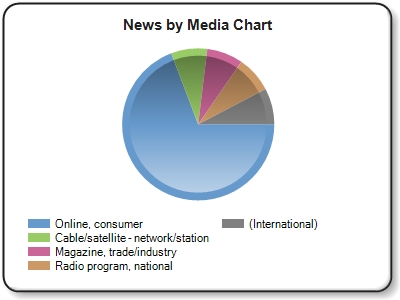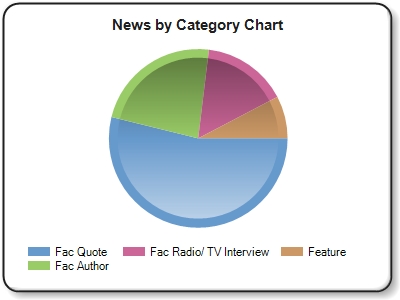Top Story
| An Obama Insider Is Now American University's President. She's Not Going to Live on the Defensive |
| Washingtonian featured a Q-and-A interview with President Sylvia Mathews Burwell. Burwell discussed why she chose to enter academia and lead AU, how she would advise students pursuing a career in government, and the energy she sees at AU. “The entire education sector, no matter what kind of institution, needs to think about providing access to higher education for those who want it, in ways they can get it. We want to create a prepared citizenry. We want to produce the research that continues to drive innovation and the engine of economy of the United States. That's the mission at American. I'm thinking about how we fit into the broader sector and all those kids who want to go to higher education. How are they getting it? How does it work? What is our relationship with community colleges?” (10/12) |
Faculty Authors
| Why Would the Trump Administration Ban Travel From Chad? |
| Tricia Bacon, assistant professor of public affairs, authored an opinion article for The Conversation about the Trump administration's decision to ban travel from Chad. Bacon wrote, “Sanctioning a country that has been an ally to the United States on its top national security priority – terrorism -- does serve as a red flag to other countries.” The op-ed ran in 27 news outlets including The Los Angeles Times, The Arizona Daily Star, and The Chicago Tribune. (10/08) |
| The Geography of Teacher Shortages |
| Nathan Favero, assistant professor of public affairs, authored an opinion article for U.S. News and World Report about teacher shortages in rural areas and small towns. Favero wrote, “Approaches to improving education that make sense in urban contexts do not always for [rural schools], particularly when it comes to teacher recruitment and retention.” (10/12) |
| Now Is the Time for Immigration Reform |
| Ernesto Castañeda, assistant professor of sociology, authored an opinion article for U.S. News and World Report about why lawmakers should work on a bipartisan deal for immigration reform. Castañeda wrote, “Keeping people undocumented or without a clear path to citizenship runs against American ideals of democracy and equality.” (10/10) |
Expertise
| Data on What Makes a Car 'American' Is Not-So-Fine-Tuned |
| Frank DuBois, chair of the International Business Department in the Kogod School of Business, spoke to the Wall Street Journal about the percentage of cars that are American made. DuBois noted “a car's supply chain is so global that its parts ‘assembled' in the U.S. could consist of mostly foreign components.” (10/6) |
| McGruff the Crime Dog, Outliving His Creator, Fights On |
| Wendy Melillo, associate professor in the School of Communication, spoke to the New York Times about the longevity of McGruff the Crime Dog, an ad campaign turned pop-culture icon. Melillo said, “Successful advertising campaigns always have somebody's finger on the pulse of popular culture.” (10/8) |
| Trump Administration Set to Roll Back Key Obama Clean Power Rule |
| Paul Bledsoe, adjunct professorial lecturer at the Center for Environmental Policy, spoke with MSNBC to discuss the Trump administration's attempt to roll back Obama-era environmental policies. Bledsoe said, “Climate change is hurting the American people, costing lives and hundreds of billions of dollars a year, right now.” (10/6) |
| What Are the Best US High Schools? It Depends |
| Laura Owen, scholar-in-residence in the School of Education, spoke to Voice of America about high school rankings. Owen said, “Just because a school is ranked highly does not mean it's the best school for every child.” (10/10) |
| As Trump Escalates Feud With Corker, Bannon Targets Rest of Senate GOP |
| David Barker, director of the Center for Congressional and Presidential Studies, spoke to WJLA about President Trump's relationship with Congressional Republicans. Barker said, “I don't think Republicans really support Trump's agenda; I think he supports theirs on taxes and healthcare.” (10/10) |
| Fact-Checking the NRA's Response to Proposed Gun Laws After Las Vegas |
| Robert Dinerstein, associate dean for experiential education at the Washington College of Law, spoke to PolitiFact for a story fact-checking a point about the Social Security Administration that came up in the National Rifle Association's response to gun law proposals. “You don't get those [social security] benefits unless you can demonstrate some significant impairment,” said Dinerstein. (10/10) |
| International, Domestic Worry Over Expected Decertification Iran Deal |
| Joshua Rovner, associate professor in the School of International Service, spoke to Voice of America about the expected decertification of the Iran Nuclear Deal. Rovner noted that “any unraveling of the Iran deal would have a number of lesser-understood negative consequences for the United States.” (10/11) |
| China: How a Superpower Sets Its Own Agenda |
| Ji-young Lee, assistant professor in the School of International Service, appeared on NPR's “1A” to discuss the upcoming Chinese Communist Party Congress. Lee said, “From the perspective of regional players in Asia, and also the United States, one way to think about the National Party Congress is as a signal coming from China in terms of what China's future trajectory might be.” (10/12) |
|



